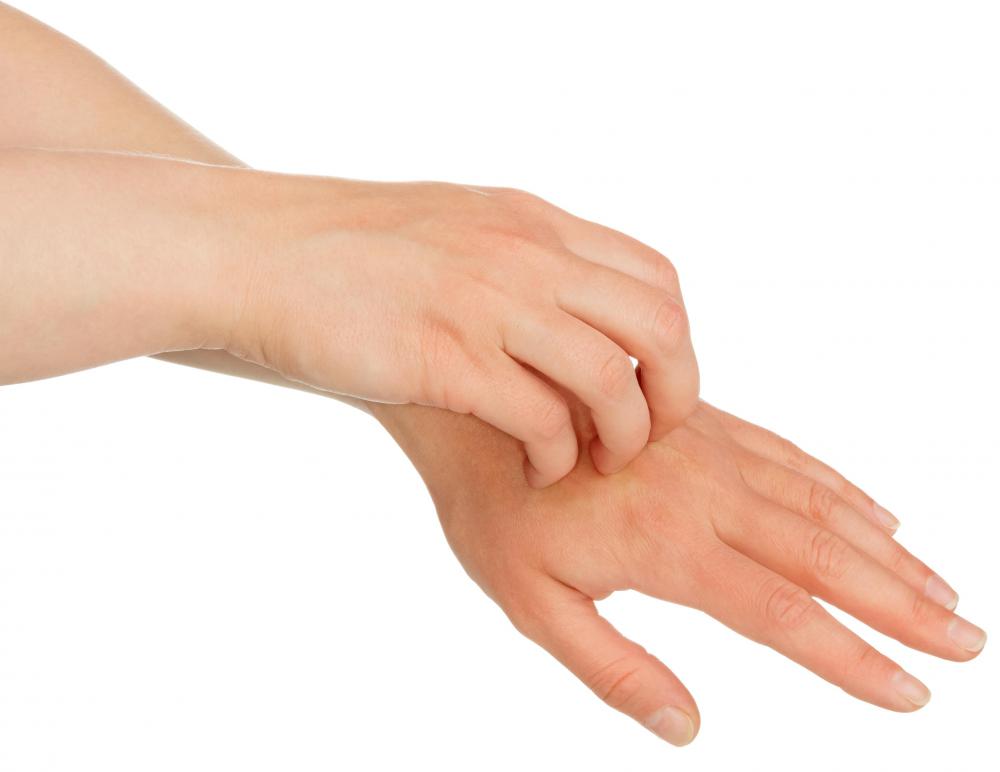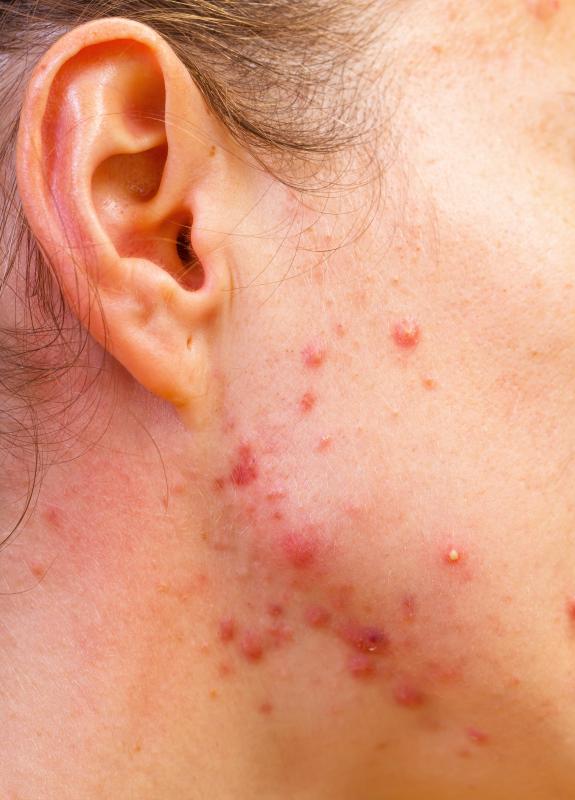At TheHealthBoard, we're committed to delivering accurate, trustworthy information. Our expert-authored content is rigorously fact-checked and sourced from credible authorities. Discover how we uphold the highest standards in providing you with reliable knowledge.
What Are the Common Causes of White Flaky Skin?
There are several possible causes of white flaky skin, including fungal infections, eczema, and psoriasis. Sun exposure, vitiligo, and dehydration can also lead to the development of skin that appears white and flaky. If these patches of skin appear on the scalp, dandruff or seborrheic dermatitis may be to blame. A doctor should be consulted in order to obtain an accurate diagnosis and an individualized treatment plan when skin problems develop. A dermatologist is a doctor who specializes in the diagnosis and treatment of skin disorders and may be the most appropriate choice in cases such as these.
Fungal infections are frequently responsible for the appearance of white flaky skin. Athlete's foot causes the skin on one or both feet, particularly the area between the toes, to become dry and flaky. Itching, redness, and burning may also develop as a result of this infection. Ringworm can develop anywhere on the skin and leads to one or more lesions that look like a ring. Jock itch is characterized by patches of white, flaky skin in the groin areas. Over-the-counter medications are available to treat all of these contagious conditions, and care should be taken to avoid infecting others.

Eczema and psoriasis are potential causes for white flaky skin. Also referred to as atopic dermatitis, eczema is characterized by patches of thick, scaly, itchy skin. A variety of factors may be responsible for the development of eczema, including food allergies, environmental irritants, or a genetic predisposition. Psoriasis tends to cause painful skin lesions that become dry and scaly. This skin disorder is thought to be caused by improper immune responses within the body.

Sun exposure may lead to small patches of white flaky skin, while sunburn may cause more widespread skin damage and result in large areas of flaking or peeling skin. Vitiligo, also referred to as leucoderma, is an autoimmune disorder that leads to the development of one or more patches of pale white skin that is often dry or flaky. Dehydration can cause the skin to become dry and is treated by consuming extra fluids.

White flaky skin that appears on the scalp is often caused by dandruff, which is basically just dry skin that affects the scalp. Over-the-counter shampoos are normally effective at treating dandruff, although prescription shampoos may be needed on occasion. Seborrheic dermatitis, called cradle cap in infants, causes dandruff, itching, and inflammation of the scalp and may be treated with antifungal medications or topical steroids.
AS FEATURED ON:
AS FEATURED ON:

















Discussion Comments
I am 27 years old and I have white patches on my skin. Please tell me how to remove this.
Sunburn causes major white flaky skin. Once you get through that initial phase of bright red skin, you start to see these large flaky lines that just beg to be peeled.
I take hold of them and gently peel them off. Sometimes, I can remove large areas of skin without any pain. Other times, I wind up peeling too far and getting into skin that wasn't ready to come off yet, and it really hurts!
If you aren't burned too badly, you can sometimes prevent your burned skin from peeling by applying aloe vera gel after you shower. I put it on both day and night for extra protection from flaking.
I've had ringworm on my leg before. It looks like a little red ring, but it makes your skin really dry.
I had to use a medicated cream on it instead of just regular body lotion. Hydrating the spot wasn't enough. I needed to treat the cause of the flakiness.
@feasting – I used to have white, flaky patches on my scalp right above my hairline. The flaking was very obvious, and regular dandruff shampoo wasn't working.
I tried another kind that I had heard good things about. This shampoo contains tar, which sounds weird, but it actually works.
It does smell a bit powerful and like something that belongs in my husband's shop, but once I apply good smelling conditioner, I can't even smell it on my hair anymore. It worked in just one use, and the instructions say to only use it as needed and not all the time.
Dandruff on the scalp is really troubling. I've had it for awhile, and medicated shampoos don't seem to be working.
It's frustrating, because I can't apply moisturizer to my scalp. My hair would look all oily if I did.
Post your comments